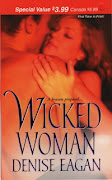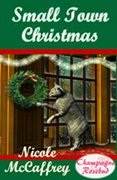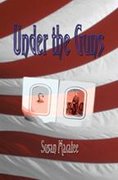Scandalous Victorian Denise tells us about her writing and her new release, The Wicked Woman.
Why do you write historical?
History fascinates me—I love to analyze where we were to understand better where we are. But then when I hear some new tidbit, my first thought is, “What if a man did this? What if a woman did that? What would happen if. . . .” “What If” is the quintessential question every fiction writer starts with. For me, history tends to spark it more than current events. Besides, I’m going to read historical stuff anyway—I might as well use it!
What part of the Victorian era/setting do you write in?
I write in all of the subsets of the era. Wicked Woman is set in 1855. The sequel, Wild Card is in 1885. I also write in different areas across the U.S. I can’t seem to think of the 19th century as split between The Old West, The Civil War, The Gilded Age etc. I seriously doubt the people back then did, either. From what I understand, the people who went West primarily went to get rich (especially the 49ers!). The first thing they wanted once they moved past subsistence living was to purchase luxury items from back East, that was their definition of Success. Moreover, San Franciscan Society copied New York Society, and New York Society copied London Society. The Civil War affected the entire country and its affects lasted long after 1865—much of the Western settlers were displaced Southerners, including freed slaves. The Women’s Movement started in the 1850’s, quieted during the war, and then came on strong in the latter half of the century. To me the era was all interconnected and I feel compelled to write it that way. I sure hope it comes across in my books.
What is it about the era that most intrigues you?
The rapid technological and societal changes. Technologically the 19th century starts with oil lamps, fireplaces, letters, and horses. By the end its progressed from oil to gas lighting to electric lighting, fireplaces to stoves to furnaces, letters to telegraph to telephone/cable for communication, horse to steamships and trains for travel. If a person lives only 60 years, say from 1830 to 1890, he would have seen the majority of those changes. It must have them with their head spinning, much like many of us feel today. I can’t resist exploring that.
As for societal changes we start with agriculture and shipping as the primary ways to make a living, and move into the industrial revolution. In the beginning large families were preferred to help create wealth. In the end they were a hindrance. Women started the period pretty much as chattel. At the end they were earning college degrees and often supporting themselves. In the beginning—maybe due to the changes in family structure?—sex was accepted as natural, something enjoyed by both parties. At the end it many assumed that women were almost entirely uninterested moved by sex. Birth control seemed to follow suit, from not available, to widely available, to illegal, at least in the U.S. Changes in law, medicine, and I could just go on and on. . .
Again, I feel compelled to explore all of it—the conflicts that the changes created are fascinating! To me conflict is best understood through relationships, and the best relationship books are romances. Not just between hero and heroine, but the conflicts within families that either help or hurt the romantic relationship. I just love it!
Where do you get your information?
From anywhere and everywhere. I read books (which I check out of the library in stacks), I surf the net, I watch documentaries, I visit historical sights (Gettysburg, Williamsburg, coal mines in PA , The Living History Museum in Iowa) I talk to fellow historically-minded writers on the Heart’s Through History writer’s loop. It’s all fun, except for those really frustrating times when there is one tiny piece of information that I can’t find. It’s not so fun then.
What are you working on now?
I’m working on a manuscript which is a sequel to Wicked Woman and Wild Card . It’s currently (I’m bad at titles) named Stalking Star, about a Women’s Right’s advocate who is being stalked (I refer to him as a secret admirer) by a man who hates everything about the movement. In the meantime the heroine (a la The Bostonians) has rejected marriage to devote herself to the Cause. But she’s not happy with the Victorian assumption that she has also rejected sex. When she meets a Colorado rancher and sparks fly, she hopes that his Western roots will make him less conservative. By the time she realizes it doesn’t, she’s already hooked.
How many books have you written?
I think it’s 9. I haven’t counted lately because it’s pretty daunting seeing all those unsuccessful. A couple were early attempts at contemporary before I realized that I’m happiest as a historical writer. Almost all of them have a dead body in them somewhere. Sometimes it’s a death that’s haunting the characters (usually a murder :)). Sometimes somebody dies during the story. I just can’t seem to write a story without a body.
Do you write outside of the Victorian era, genre?
As I’ve said I have written a couple contemporaries and I do have some ideas for more of those, although my first love is the historical. I also have a Revolutionary War manuscript about a spy (highly disliked, by the way—spying didn’t gain a whole lot of cache until the 20th century.). The heroine considers herself a Tory. Couldn’t help but write that one, the conflict was so much fun, even if cliché!
What challenges have you faced in your career?
It took me 17 years before I got “The Call” and along the way I’ve faced all the usual—rejection, bad contest scores and critiques, bad agent/editor appointments, and of course the ever-present family intervention. But in the end I’m my own worst enemy. I listen to the negative voices in my head telling me I can’t get something published, I’m a hack not a writer, my plots are pure schlock—you name it those nasty voices have said it to me. The wonderful part about writing fiction is you get to live through your characters (which, other than being a re-enactor, is the only way to “live” history). The bad part is your mind can imagine truly horrible scenarios for your own life.
What is you writing schedule like?
Schedule? What’s that?
Seriously I do try to make up schedules, but I don’t always follow them. I try to confine promotion and the business of writing to the weekends. I find that the creative part of writing and business come from different part of my brain. It’s pretty hard to switch gears for me, too, so I’m better off having full days of one or the other.
Although I don’t write every day, the first thing I do every morning, right after I get coffee, is turn on the computer. If I think it’s going to be one of those days that I’m going to have a difficult time getting myself to work, I’ll open up a file and leave it on the screen to remind myself of priorities.
Friday, December 07, 2007
Subscribe to:
Post Comments (Atom)









3 comments:
Dee, as always you crack me up. Love the interview, esp. the part about the bodies.
Lol, Christine. I did try to make the current WIP murder-free. It's the 3rd in this series and I thought, "How many murders can one family realistically be part of?".
But I sort of got bored plotting it, so I threw in the stalker thing. And one thing led to another. . . .and now I've got 3 dead bodies in the story! I tried--I really did!
Great interview, Dee!
I enjoyed reading how you came to where you are now. And the part about the bodies is too funny!
It made me realize I have at least one body in each of my WIPs, although only two of them were murder victims. The other two were killed in the war.
Post a Comment